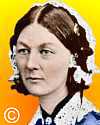
A medical triple feature for this newsletter begins with two people who died not quite a half-century apart on this day. But they had something in common—caring about clean bed sheets for their hospital patients. That, and much more, make them both giants in the history of improvement of hospital conditions. A third physician, who also died on this day, introduced a new techique for diagnosis that is a staple for today's doctors, and makes him also worthy of special recognition. You have undoubtedly been touched by his invention.
On 13 Aug 1910, Florence Nightingale died, the English nurse and statistician, known as “The Lady With The Lamp,” who tirelessly worked for the improvement of nursing practices following her experience in the Crimean War, and continued to raise respect for nurses as medical professionals.
In 1855, she provided the House of Commons Inquiry on Scutari, with a Report upon the State of the Hospitals of the British Army in Crimea and Scutari. In it, she detailed the problems with requisitioning necessary supplies. She continued with information on how she provided the wounded soldiers with clean shirts, and the regimen she introduced for washing clothes, sheets and bandages. A relatively short read, this is an interesting insight into the difficulties she faced and attempted to overcome, all in her own words.

On 13 Aug 1865, Ignaz Semmelweis died, the German physician who greatly reduced deaths from puerperal (“child bed”) fever by introducing antisepsis into medical practice. He insisted on health workers rigorously handwashing between patients, and clean bed sheets. His efforts met with much resistance from a profession of doctors too unwilling to change their habits. But he persisted, and looking back, we know he right and give him more respect for what he accomplished than he received during his lifetime. His struggles, and sad circumstances of his own death, are a stimulating read in this article Pathfinders in Medicine: Semmelweis, the Obstetrician from Medical Review of Reviews (1912).
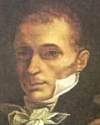
On 13 Aug 1826, René Laënnec died, a French physician whose lasting contribution to medicine is described in an article Laënnec And Auscultation, from Pathfinders in Medicine (1912), which also gives you as reader an insight into his life and times.

On 13 Aug 1888, John Logie Baird, a Scottish engineer was born, who was the first man to televise outline pictures of objects (1924) followed the next year by recognizable human faces. By 1926, he was able to demonstrate TV for moving objects at the Royal Institution, London, and colour TV in 1928. Today's book pick is: Television And Me: The Memoirs of John Logie Baird, by John L Baird. The genius who not only invented television but went on to develop colour and 3D versions of it, wrote his own life story. It is a highly readable account of the dramatic pioneering days of television. With blunt candour and caustic wit, he writes about the wild escapades of his early business career and later troubled relationship with Lord Reith and the fledgling BBC. This heavily illustrated edition adds new material, including a recently discovered final chapter by his wife, and together gives us a very human portrait of the harshly honest, but sophisticated and cultured man who was one of the creators of the modern world.
It is available from Amazon, typically about New from $15.53. Used from $3.50. (As of earlier time of writing - subject to change.)
 | Apprehension, uncertainty, waiting, expectation, fear of surprise, do a patient more harm than any exertion. Remember he is face to face with his enemy all the time. |
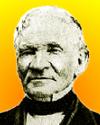 | The fact is generally known that nearly all liquids contain a variety of minute living animals, though in some they are too small for observation, even with a microscope. In others, especially in water that has been long stagnant, these animals appear not only in hideous forms, but with malignant and voracious propensities. … we cheerfully and heartily recommend the adoption of filters by all who use this water, from either the public or private hydrants. |
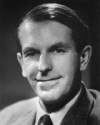 | Scientific research is one of the most exciting and rewarding of occupations. It is like a voyage of discovery into unknown lands, seeking not for new territory but for new knowledge. It should appeal to those with a good sense of adventure. |
| Before you look at today's web page, see if you can answer some of these questions about the events that happened on this day. Some of the names are very familiar. Others will likely stump you. Tickle your curiosity with these questions, then check your answers on today's web page. | |
| Births | |
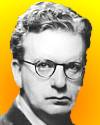 | John Logie Baird, a Scottish engineer (1888-1946), was the first man to televise outline pictures of objects (1924) and recognizable human faces (1925). In 1926, he demonstrated TV for moving objects at the Royal Institution, London. By 1928, he showed his attempt at colour television. The British Broadcasting Corporation (BBC) formed a committee in 1936 to compare his system with a competing system of Marconi Electric and Musical Industries. It was the Marconi-EMI all electronic system that the BBC adopted in Feb 1937. Baird also worked on stereoscopic television. He even recorded experimental silent moving 30-line images, which have been played back with modern technology, and posted on YouTube! What medium did Baird use to record his 30-line moving images? |
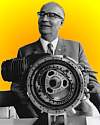 | Felix Wankel, born 13 Aug 1902, was a German engineer and inventor of the Wankel internal combustion engine. Advantages of the Wankel engine include light weight, few moving parts and compactness. What was Wankel's novel innovation in his engine? |
| Deaths | |
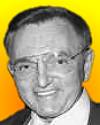 | Jack Ryan (1926-1991) was an inventor with 1000 patents. Which of the following did he invent: Barbie, Military Missiles, Hot Wheels? |
 | René-Théophile-Hyacinthe Laënnec (1781-1826) was a French physician whose invention means he is generally considered the father of chest medicine. What device did he invent? |
| Events | |
 | On 13 Aug 1642, Christiaan Huygens discovered a Martian feature. Which feature on Mars did he observe? |
 | On 13 Aug of a certain year, William Gray of Hartford, Connecticut, received the first U.S. patent for a coin-operated telephone. In which decade was this patent issued? |
Fast answers for the previous newsletter for August 12: P.A.M. Dirac • roots outwards and stems inwards • transistor, valve or tube amplifiers • The Rocket • Deimos • after the spacecraft of the Star Trek TV series • zebra • Joseph Lister.
 If you enjoy this newsletter, the website, or wish to offer encouragement or ideas, please send feedback by using your mail reader Reply button.
If you enjoy this newsletter, the website, or wish to offer encouragement or ideas, please send feedback by using your mail reader Reply button. Your click on a Facebook, StumbleUpon, or other social button on the site webpages is also a welcome sign of appreciation. Thank you for using them.
© This newsletter is copyright 2020 by todayinsci.com. Please respect the Webmaster's wishes and do not put copies online of the Newsletter — or any Today in Science History webpage. (If you already have done so, please remove them. Thank you.) Offline use in education is encouraged such as a printout on a bulletin board, or projected for classroom viewing. Online, descriptive links to our pages are welcomed, as these will provide a reader with the most recent revisions, additions and/or corrections of a webpage. For any other copyright questions, please contact the Webmaster by using your mail reader Reply button.
--
If you do not want to receive any more newsletters, Unsubscribe
To update your preferences and to unsubscribe visit this link
Executive Real Estate Business Class
-
"It was like a man with wings. It wasn't like anything you'd see on TV or in a monster movie." ...
About the publisher
Search This Blog
Blog Archive
-
▼
2021
(585)
-
▼
August
(32)
- Newsletter for Tuesday 31 August.
- Newsletter for Monday 30 August.
- Newsletter for Sunday 29 August.
- Newsletter for Saturday 28 August.
- Newsletter for Friday 27 August.
- Newsletter for Thursday 26 August.
- Newsletter for Wednesday 25 August.
- Newsletter for Tuesday 24 August.
- Newsletter for Monday 23 August.
- All-New Tonight: 'The Machines That Built America'
- Newsletter for Sunday 22 August.
- Newsletter for Saturday 21 August.
- Newsletter for Friday 20 August.
- Newsletter for Thursday 19 August.
- Newsletter for Wednesday 18 August.
- Newsletter for Tuesday 17 August.
- Newsletter for Monday 16 August.
- Newsletter for Sunday 15 August.
- Newsletter for Saturday 14 August.
- Newsletter for Friday 13 August.
- Newsletter for Wednesday 11 August.
- Newsletter for Tuesday 10 August.
- Newsletter for Monday 9 August.
- All-New Tonight 9/8c: Telephone Wars
- Newsletter for Sunday 8 August.
- Newsletter for Saturday 7 August.
- Newsletter for Friday 6 August.
- Newsletter for Thursday 5 August.
- Newsletter for Wednesday 4 August.
- Newsletter for Tuesday 3 August.
- Newsletter for Monday 2 August.
- Newsletter for Sunday 1 August.
-
▼
August
(32)
-
Blogroll
-
About
HistoryFact










This comment has been removed by the author.
ReplyDelete